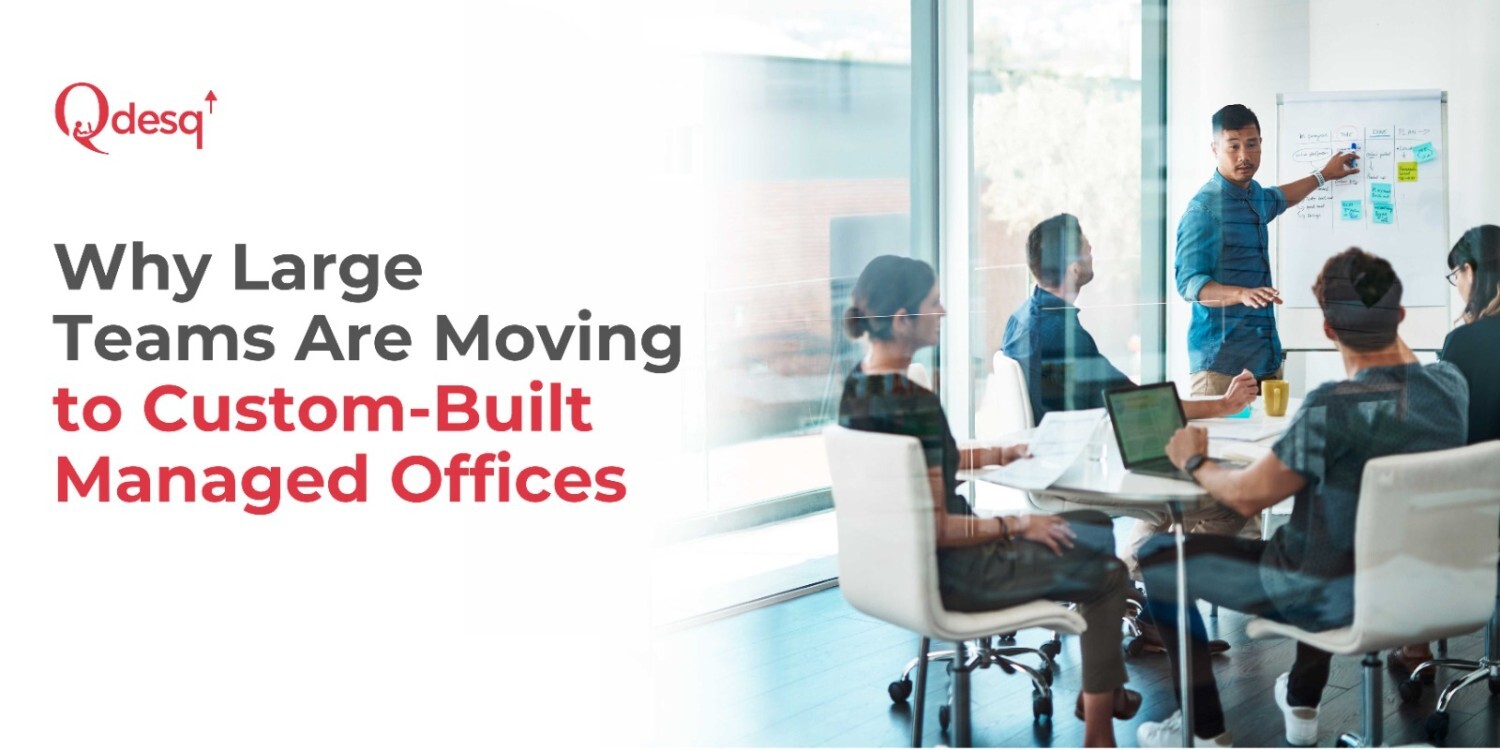Across India’s corporate real estate landscape, custom-built managed offices are rapidly emerging as the preferred option for large teams. Unlike conventional leases or one-size-fits-all coworking spaces, these workspaces are tailored, fully serviced, and built to scale. One industry insider aptly called them “private workspaces built for scale.”
Companies like Table Space, Brigade’s BuzzWorks, Indqube, Smartworks, etc, are teaming up with enterprise clients to deliver plug-and-play managed offices in India that blend flexibility with the control of traditional setups.
According to CBRE, flexible office deals accounted for 21% of India’s leasing volume in Q4 2024, a sharp increase from 12% the previous year. This shift reflects a strategic pivot across industries, from tech and consulting to finance and manufacturing, toward more adaptive workplace models.
Flexibility and Scalability
Flexibility is at the heart of why enterprises are choosing managed offices. Rather than committing to long leases or investing time and capital in fit-outs, companies now opt for managed spaces that let them expand or downsize quickly. The “Core+Flex” model, where a company retains a lean headquarters and expands through flex hubs, is gaining traction across India.
In 2024, flexible workspace leasing increased by 57.5% year-over-year, with over 80% of enterprises exploring this model. Coworking operators offer custom build-outs within 90–135 days, compared to 18–24 months for traditional setups.
Flexible managed office spaces support growth across multiple cities while maintaining consistency in design and infrastructure. With modular layouts and short ramp-up times, managed offices enable businesses to scale teams rapidly, especially in talent hubs like Pune, Noida, and Hyderabad, without being hindered by real estate constraints.
Operational Efficiency and Agility
Managed offices streamline both setup and operations. Instead of investing crores in fit-outs and overheads, companies pay a monthly fee that includes rent, security, housekeeping, internet, and utilities, saving time, capital, and effort. Tech-enabled features, such as IoT-based systems, app-based access, and smart meeting room bookings, further enhance efficiency. Providers manage everything end-to-end, allowing internal teams to focus on business priorities.
Industry projections suggest that by 2025, 85% of managed offices will utilise real-time analytics and automation to optimise space utilisation and service delivery. The model also enhances cost efficiency by distributing costs across tenants, enabling providers to lower per-seat expenses while offering premium amenities. The short lease cycles and easy exit terms enable businesses to stay agile, enter new markets faster, or pivot during restructuring—all without the financial burden of traditional leases.
Branding and Customisation
One of the most significant advantages of managed offices is complete brand alignment. Unlike coworking floors shared by multiple companies, these spaces are built from scratch to reflect your identity—layout, interiors, colours, and even artwork are tailored to match your company’s culture.
Providers like Table Space and Skootr deploy in-house teams to create fully customised environments. Whether it’s a tech firm needing collaboration pods or a legal consultancy prioritising private cabins, the setup adapts to your function and industry. Location flexibility adds to the appeal—companies can maintain branded offices in both central business districts and emerging corridors, allowing for a seamless transition.
This helps attract talent while maintaining a consistent brand experience across regions. In sectors such as finance, consulting, and IT, where perception and professionalism are crucial, this level of customisation is a game-changer.
Employee Experience and Well-being
Managed offices go beyond functionality—they elevate the employee experience. These spaces include wellness zones, ergonomic furniture, natural lighting, and breakout lounges that promote comfort and productivity.
In a 2023 workplace survey, 91% of Indian professionals reported that wellness-driven environments improved their productivity. Providers are responding with thoughtful design, event spaces, and even mentoring programs. For example, Cimpress India’s WeWork setup features a balance of collaborative lounges and quiet zones, supporting different team needs under one roof. Following the COVID-19 pandemic, health features such as touchless entry, HEPA filtration, and occupancy monitoring have become standard, creating safer and smarter workplaces.
These enhancements not only improve employee satisfaction but also support retention and recruitment. In today’s competitive job market, offering a managed office with built-in comfort, safety, and culture-building opportunities can give companies a real edge.
Market Trends and Industry Adoption
The numbers back all this up. Cushman & Wakefield report that India’s flex workspace sector reached a record 12.4 million sq. ft. of leased space in 2024, representing a 57.5% year-over-year increase. About 224,000 flex seats were added that year alone. Large companies are leading the charge, blending managed offices into their Core+Flex strategies to stay nimble.
Tech and finance top the list. In Q1 2025, BFSI firms made up 26% of total office leasing, with IT firms close behind at 24%. Flex-specific leasing saw IT-BPM firms occupying nearly half the seats. Even manufacturing and government-linked entities are joining in. India’s national airline recently partnered with a managed provider to roll out a new headquarters in just 45 days, on brand, on budget, and on time.
Tier-2 cities are also heating up. While metros like Bengaluru and Mumbai lead the pack, places like Pune, Ahmedabad, and Hyderabad are catching up fast. As commute woes and urban costs rise, suburban campuses are becoming increasingly attractive. Analysts estimate managed offices in these locations are 30–35% cheaper per seat than their metro counterparts.
Conclusion
For decision-makers weighing office options, the case for custom-built managed offices is stronger than ever. These spaces offer a rare mix: agility, brand alignment, employee focus, and cost efficiency. Companies across industries are embracing them not as temporary fixes but as a foundational strategy. And as the Indian workplace continues to evolve, managed office providers are no longer just landlords; they’re partners in growth.
In a fast-moving market, that kind of support isn’t just helpful; it’s essential.











